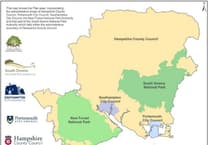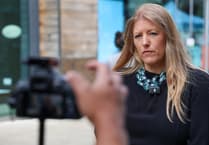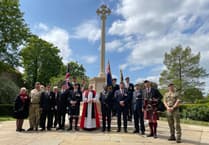Norah Bryson (nee Letch) has celebrated her 100th birthday – and had lived a quite remarkable life.
Norah enrolled as a pupil nurse at the age of 17 after spending a period of time in hospital with a serious illness – because she was so impressed with the care that she received she had determined to become a nurse herself.
Norah trained at the Isolation and Chest Hospital in Southampton – somewhat of a baptism of fire for such a young woman, as they nursed patients who were brought straight from the ships which docked there from all over the world, carrying all sorts of infectious diseases.
They had a ward always kept ready in case of a pandemic striking.
They also nursed patients from the county with measles, diphtheria and polio (in iron lungs) and were at constant risk of contracting illnesses themselves.
Indeed, Norah was seriously ill for a few months, which delayed her training, and two of her good friends died there.
After three years, in 1941, she transferred to Southampton General Hospital to do her general nursing training, becoming a ward sister.
These were very difficult times as Southampton was subject to intense air raids, being an important dock, and also having the Spitfire factory in the city.
One of her stories of that time is of trying to get back to the hospital after leaving a cinema when bombs began falling and being thrown to the ground by a warden who then lay on top her.
He helped her to the hospital to begin an emergency shift, but her uniform was in tatters and she had to find a spare dress to wear but without the cuffs etc, and so was improperly dressed to take in casualties.
The hospital was having an increasing number of Forces patients, since troops were secretly amassed in the area in preparation for the invasion of France, then were inundated with casualties fresh from the battlefield as D-Day commenced.
Men were brought in straight from the ships and planes, still in battledress, to wards including Norah’s, to be cleaned and patched up as best they could, then transferred out, often the next day to make room for more. Many had lost limbs or were badly burned.
As ward sister, Norah trained and led a specialist team to deal with the worst of these.
A huge sadness for her is she never learned of the fate of any of ‘her boys’, how many survived or went on to eventually lead meaningful lives.
All except for one.
One night Simon Fraser, Lord Lovat, the Brigadier Commander of the 1st Special Forces Brigade (the newly-formed Commandoes) was brought in with severe abdominal wounds.
After many hours in surgery, he was put in a side ward, where he was nursed before being transferred north.
During those days he was secretly visited by Queen Elizabeth, the staff being told he was a relative of hers.
This did wonders for morale, of course. Norah was later able to follow his life story, pleased to know that at least one of ‘her boys’ survived, and after a long convalescence led a very meaningful life.
After the war Norah qualified as a midwife, becoming a district midwife and carrying out home deliveries for several years in Guildford until in 1951.
After her mother died – her only close family – she decided to join the Army to travel the world.
She enrolled as a nurse and midwife at the age of 28 into the Queen Alexandra’s Royal Army Nursing Corps (QAs). She served in the Corps until 1967, rising to the rank of Major, and was awarded the ARRC upon her retirement.
She has many incredible stories to tell of her postings abroad, which included Germany, Singapore, Hong Kong and the Malaysian jungle during the Rebel Uprisings, and her final one in Jamaica.
One of the happiest stories, though, was while Norah was stationed in Singapore in 1954. A ship called the Stanley Angwin docked for a few days, on relief from duty as the communications support vessel to the SS Gothic, the-then Royal Yacht, as it returned from the Queen’s Commonwealth Tour.
The Yacht Brittania was just coming into service and met the Queen at Gibralter to convey her on the final leg of her tour.
A few of the senior nursing officers serving in the hospital in Singapore were invited to a dinner aboard the Stanley Angwin, and it was there (involving a long and humorous story) that Norah met Thomas Bryson, a Marine Engineer on the ship – the man who eventually became her husband.
However, their romance was a long and tricky one, mostly conducted by letter and telephone, as Norah’s postings moved her around the world, as did Tom’s work – he became a respected senior engineer specialising in turbines and was sent out to deal with engine emergencies at sea, including on the liner the Queen Elizabeth II.
Norah completed her career as a QA at the Louise Margaret Maternity Hospital in Aldershot, where she became the first ever accredited midwifery sister tutor.
She was asked to set up the Army Midwifery School there, training new midwives and delivering babies until she retired in 1967.
Many of her pupil midwives are still good friends of hers, and keep in touch from around the world. Indeed, even now Norah exchanges letters and phone calls with many of them.
QAs were known as ‘dedicated spinsters’ as until 1967 they were not allowed to marry. Norah was offered the chance to be the first woman in the Forces to marry, but decided to retire instead as she felt she’d be unable to do justice to her work as a senior tutor while being newly married and setting up home.
So Norah and Tom finally married in their 40s and set up home in Fleet.
Norah continued to work as a volunteer for the QA Association, acting as branch secretary and providing support to retired personnel.
She also took in stray dogs – her first, Sam, she had shipped back from her last posting in Jamaica after she’d nursed him back to health.
She also became ‘auntie’ to many local children, who took her injured wildlife they found to be needing her special care, and an agony aunt to many who knew her and her wisdom.
When declining health necessitated her moving into a care home five years ago, she moved into Waverley Grange in Farnham.
There she continued her ‘listening’ role to residents and staff, until this last year when her loss of hearing and the restrictions of Covid took this role away from her.
She is still a remarkable woman with a wonderful memory and great sense of humour.
We had been looking forward to her 100th birthday this month and had expected many friends, old and new, would have been there, as well as her husband’s family members.
However, this current crisis denied her this celebration – and we just had to do the best we could. But Norah’s spirit remained undimmed.
Written by Joan Chapman, who is Norah’s niece. Joan says: “Norah is still officially covered by the Official Secrets Act and I had to gain permission from the top brass before sending anything for publication! Norah is a very modest lady and was somewhat shocked I had written this as she couldn’t see why anyone would find it interesting. She would also like to say that it was a privilege to help all those who were endeavouring to help our country’s problems.”





Comments
This article has no comments yet. Be the first to leave a comment.